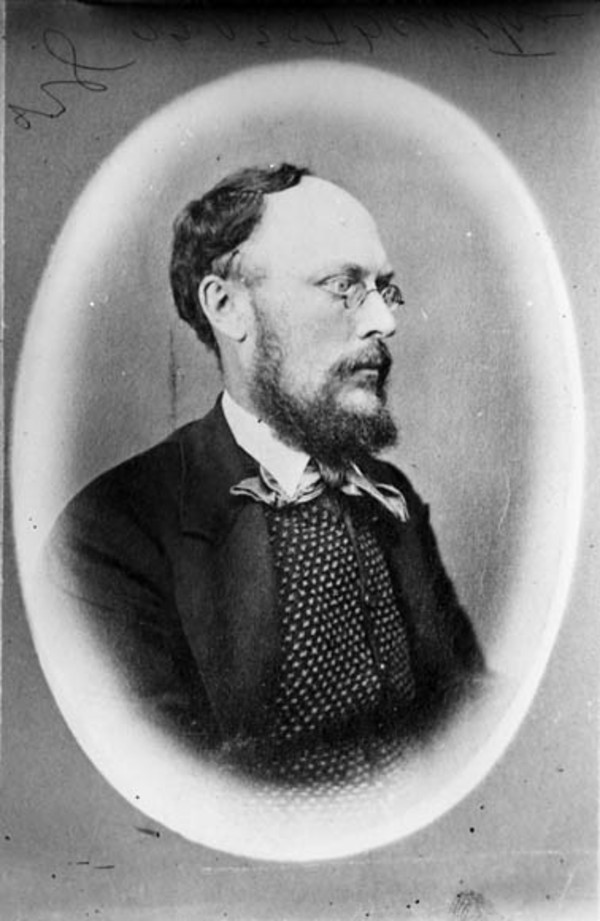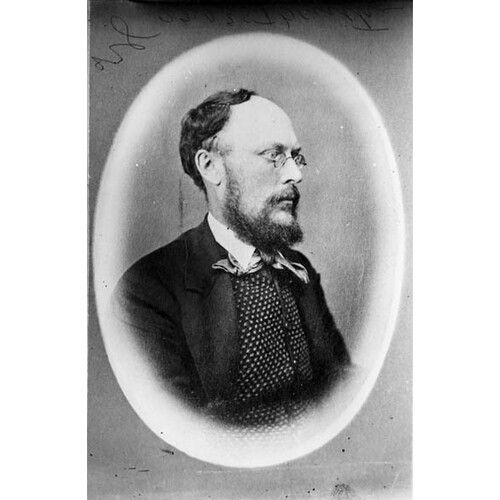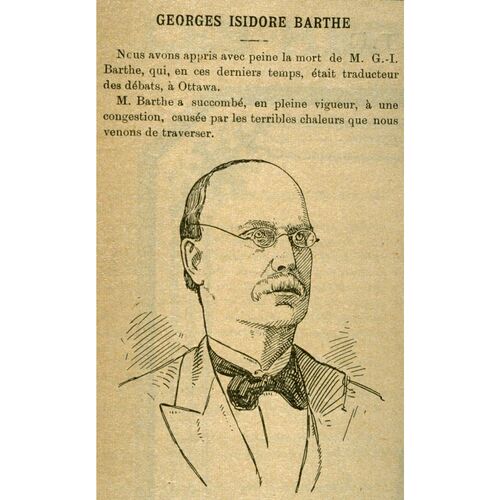BARTHE, GEORGES-ISIDORE (baptized Isidore), office holder, journalist, lawyer, publisher, politician, jp, and author; b. 16 Nov. 1834 in Restigouche, Lower Canada, son of Joseph Barthe and Marie-Louise-Esther Tapin, and younger brother of Joseph-Guillaume; m. 1861 Joséphine-Charlotte Meilleur, daughter of Jean-Baptiste Meilleur*, and they had nine children; d. 11 Aug. 1900 in Ottawa.
The Barthe family were descendants of Thaddée-Alexis Barthe, a native of Toulon, France, who had come to the Gaspé as a fisherman and in 1784 married Louise-Françoise Poisset in Carleton. The eldest of their three children, Joseph (Georges-Isidore’s father), was a sea captain and had owned a shipyard in Carleton before moving to Restigouche.
Georges-Isidore Barthe entered the Séminaire de Nicolet in 1847. He left, however, before completing his classical studies. He was called to the bar on 6 Oct. 1856, after having studied law with Napoléon Bureau of Trois-Rivières from 1851 to 1853 and with the Montreal firm of Andrew* and George R. Robertson from 1853 to 1855.
Barthe was the first to become secretary-treasurer of the town of Trois-Rivières, an office he held from 23 July 1855 to 30 June 1857. He was still a law student when on 3 April 1855 he and Charles-Odilon Doucet of Trois-Rivières formed a company to publish a newspaper promoting the idea of independence for Lower Canada. Like his brother Joseph-Guillaume, Barthe dreamed of an autonomous Lower Canada which, with the help of France, would take its place among the sovereign states of the Americas: a Lower Canada emancipated from Britain, liberal and democratic, whose political institutions would ensure the flourishing of French Canadians, of their language, their culture, and their laws. Le Bas-Canada was short-lived; launched on 22 April 1856, it ceased publication when a great fire the following November destroyed part of Trois-Rivières. The catastrophe did not, however, put an end to Barthe’s journalistic ambitions, and a few months later he moved to Sorel.
Besides Le Bas-Canada, Barthe founded and edited, on his own or with others, no fewer than seven newspapers: La Gazette de Sorel (1857–80), the Sorel Pilot (1868–77), and the Journal du cultivateur et de l’ouvrier (1876–79) at Sorel; L’Ère nouvelle (1884–85), the New Era (1885), and L’Indépendance canadienne (1894–96) in Trois-Rivières; and the Canadian Democrat (1895) at Montreal. In 1874 he was also the owner of Le Courrier de Richelieu, published at Sorel, which had belonged to his political rival Michel Mathieu*.
Barthe considered journalism a high calling, and his career is remarkable for its continuity and for the many battles he waged in the name of freedom of the press. With his fighting spirit and unusual talent for writing, he endeavoured to be the conscience of his fellow-citizens. In this regard, his newspaper campaigns showed him for the politician he was. His vehement attacks on the municipal administration of notary John George Crebassa in the 1860s won him election as mayor of Sorel in 1864, an office he held for nine years. During his term Sorel experienced significant economic and social growth.
A liberal and a democrat, Barthe was more opposed to political parties than he was supportive of them. Profoundly nationalistic, during the 1850s he was hostile to the union of Upper and Lower Canada. At first against the plan for confederation, he finally accepted it, but not without having warned French Canadians of the dangers he saw as inherent in the powers accorded the federal government.
In a by-election of November 1870 Barthe was elected to the House of Commons as an independent Conservative member for Richelieu, but he was defeated in 1872 by Conservative Michel Mathieu. Two years later he regained his seat by a 201-vote majority. He ran again in 1878, but this time lost to Conservative Louis-Huet Massue. Barthe now felt that he had been betrayed by his political friends. Sick at heart and mentally exhausted, he believed the time had come to leave militant journalism and active politics and to resume the practice of law. On 26 Feb. 1880 he announced in La Gazette de Sorel that he had sold the paper. Two years later he again ran as an independent Conservative but was defeated by his old opponent Massue.
In 1882 Barthe moved back to Trois-Rivières, which he had left in 1856. With his brother René and a few Liberals who wanted a platform for their views, he tried to revive L’Ère nouvelle (it had earlier run from 1852 to 1864). The paper lasted only from 3 July 1884 to 29 Dec. 1885; on 2 Aug. 1884 the Liberals, divided among themselves, launched a new paper, La Sentinelle, and the rivalries smouldering within the party were brought into the open. Meanwhile, the hanging of Louis Riel* on 16 Nov. 1885 had a profound effect on Barthe, and he joined Honoré Mercier’s Parti National. This gesture of support for the French Canadian nationalist cause earned him an appointment as magistrate in the district of Trois-Rivières on 15 Dec. 1887. He was removed from office on 24 March 1894 by the Conservative government of Louis-Olivier Taillon*.
Barthe then returned to journalism and founded L’Indépendance canadienne, which was published from 13 Oct. 1894 to 13 June 1896. A liberal and nationalist paper, its aim was to promote the idea of a “Canadian republic,” with an administration decentralized to the advantage of the provinces. From 13 Oct. 1894 until 8 Feb. 1896, Barthe first published in its pages Drames de la vie réelle, roman canadien, a novel in which he recalled a number of incidents from the social history of Sorel, including the murder of Joséphine-Éléonore d’Estimauville’s husband. The ardent defender of freedom of the press no longer had any desire to fight but felt instead a need to recount his recollections of the past. He was appointed official translator to the House of Commons on 16 Nov. 1897, and died in Ottawa on 11 Aug. 1900.
Georges-Isidore Barthe was one of the best French Canadian journalists of the 19th century. The profession owes much to him. Deeply attached to the traditional values of French Canada, he waged a lifelong struggle for the triumph of democratic liberties, having drawn his basic concepts in part from his brother’s Le Canada reconquis par la France (1855). When his death was announced, the town of Sorel flew its flags at half-mast as a mark of respect for one of its early mayors.
Georges-Isidore Barthe is the author of Drames de la vie réelle, roman canadien, which was published in Sorel, Que., in 1896, after first appearing in L’Indépendance canadienne (Trois-Rivières, Qué.).
Arch. de la ville de Trois-Rivières, Procès-verbaux des séances du conseil de ville, 1850–60. Arch. du séminaire de Nicolet (Nicolet, Qué.), Séminaire, V, no.51; fichiers d’entrée. Arch. du séminaire de Trois-Rivières, 0013 (fonds J.-N. Bureau). NA, MG 27, 1E, 1. J.-G. Barthe, Souvenirs d’un demi-siècle; ou, mémoires pour servir à l’histoire contemporaine (Montréal, 1885). Procédés des citoyens des Trois-Rivières au sujet de l’incendie du 15 novembre 1856 (Trois-Rivières, 1857). La Gazette de Sorel, 28 févr. 1880. Le Monde illustré, 8 sept. 1900. Le Trifluvien (Trois Rivières), 30 mars, 3 avril 1894. Canadian directory of parl. (Johnson). J. Desjardins, Guide parl. J. Hamelin et al., La presse québécoise, vol.2–3. Le Jeune, Dictionnaire. RPQ. Statistiques électorales fédérales du Québec, 1867–1980, Pierre Drouilly, compil. (Montréal, 1983). Azarie Couillard Després, Histoire de Sorel: de ses origines à nos jours (Sorel, 1926; réimpr. 1980). Roland Legendre, “Analyse de contenu du journal Bas-Canada” (thèse de d.e.s., univ. Laval, Québec, 1968). P.-G. Roy, “La famille Barthe,” BRH, 41 (1935): 705–7.
Cite This Article
Guildo Rousseau, “BARTHE, GEORGES-ISIDORE (baptized Isidore),” in Dictionary of Canadian Biography, vol. 12, University of Toronto/Université Laval, 2003–, accessed March 1, 2026, https://www.biographi.ca/en/bio/barthe_georges_isidore_12E.html.
The citation above shows the format for footnotes and endnotes according to the Chicago manual of style (16th edition). Information to be used in other citation formats:
| Permalink: | https://www.biographi.ca/en/bio/barthe_georges_isidore_12E.html |
| Author of Article: | Guildo Rousseau |
| Title of Article: | BARTHE, GEORGES-ISIDORE (baptized Isidore) |
| Publication Name: | Dictionary of Canadian Biography, vol. 12 |
| Publisher: | University of Toronto/Université Laval |
| Year of publication: | 1990 |
| Year of revision: | 1990 |
| Access Date: | March 1, 2026 |





